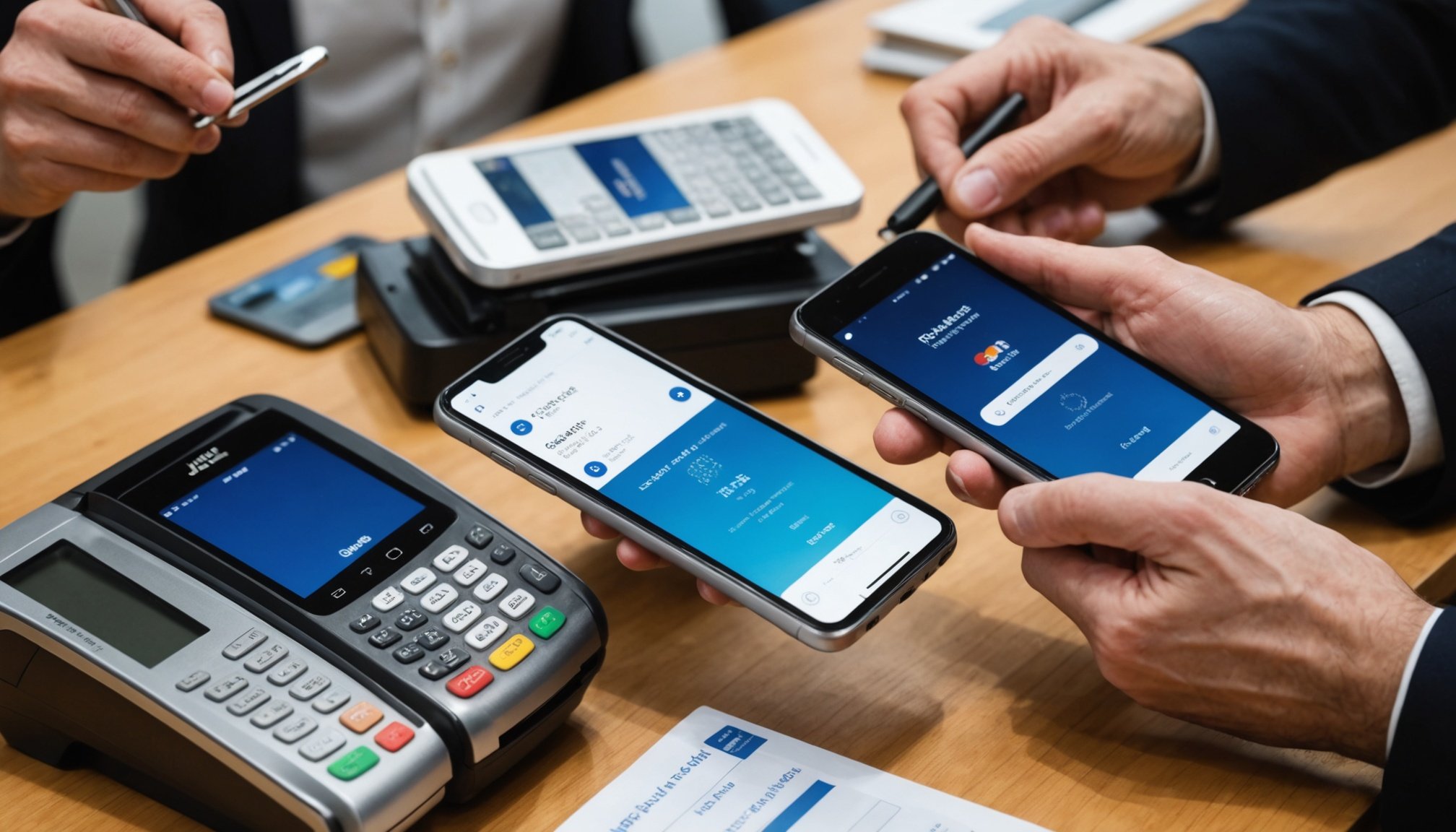Overview of Mobile Payment Systems in the UK
The rise of mobile payment systems has transformed the UK retail landscape, offering consumers a convenient and efficient way to transact. At its core, a mobile payment system enables transactions via smartphones, eliminating the need for physical cash or cards. Various types of mobile payment systems are prevalent, including digital wallets like Apple Pay and Google Pay, as well as contactless payment apps such as PayPal. These technologies streamline the payment process in the UK market by leveraging innovative payment technology.
In recent years, the UK has seen significant growth in mobile payments, driven by advancements in payment technology and increasing consumer demand for speed and convenience. Retailers have embraced this trend by integrating these systems into their infrastructures, resulting in a seamless shopping experience for customers.
In the same genre : Essential Legal Guidelines for UK Businesses Providing Telehealth Services
Several trends are currently shaping mobile payment adoption in the UK. Contactless payments have surged, especially post-COVID-19, as consumers seek hygienic payment methods. Additionally, the expansion of e-commerce has accelerated the need for efficient mobile payment solutions. Notably, the UK retail sector has responded to these shifts by prioritising digital transformations, ensuring they meet evolving consumer expectations.
Mobile payment systems in the UK represent a significant shift towards digital-first experiences, marking them as essential components of modern retailing.
In the same genre : Essential Legal Guidelines for UK Businesses: Navigating Compliance with the EU ePrivacy Directive
Key Legislation Governing Mobile Payments
In the UK, mobile payments are regulated by a robust legal framework that ensures security and compliance in the financial sector.
Payment Services Regulations (PSRs)
The Payment Services Regulations (PSRs) form the backbone of payment regulations. These regulations establish the rules for handling transactions and safeguarding user data. Financial institutions must adhere to these regulations to guarantee consumer protection and operational transparency.
Role of the Financial Conduct Authority (FCA)
The Financial Conduct Authority (FCA) plays a pivotal role in supervising and enforcing financial laws. It ensures that payment regulations are not just theoretical but implemented in practice, thus maintaining a fair and secure mobile payments environment. The FCA oversees compliance, investigates violations, and has the authority to penalise misconduct.
Impact of the Electronic Money Regulations (EMRs)
The Electronic Money Regulations (EMRs) are equally essential components of the UK legal framework. They govern the issuance and management of electronic money, which is a core element of many mobile payment systems. The EMRs impose additional requirements on financial companies, thus enhancing user trust and market stability.
Understanding these regulations helps ensure that the payment landscape remains transparent, secure, and competitive. This knowledge promotes technological development and innovation while protecting consumer interests.
Compliance Issues for Retailers
In today’s retail landscape, understanding and meeting compliance requirements is crucial. Retailers face numerous legal obligations and must adhere to industry standards to operate successfully and maintain customer trust.
Data Protection and Privacy Regulation
Retailers must comply with data protection regulations like the General Data Protection Regulation (GDPR). GDPR mandates retailers to protect consumer data and provides guidelines on data collection and processing. Failing to comply can result in heavy fines and damage to reputation. Retailers should ensure robust security measures, gain informed consent for data collection, and offer customers access to their personal information upon request.
Anti-Money Laundering (AML) Requirements
Anti-Money Laundering (AML) requirements are crucial for retailers handling significant cash transactions. AML policies help prevent the misuse of services for money laundering activities. Retailers must conduct customer due diligence and report suspicious activities. It’s vital to train staff on AML practices and implement effective transaction monitoring systems.
PCI DSS Compliance
The Payment Card Industry Data Security Standards (PCI DSS) are essential for retailers processing credit card payments. PCI DSS ensures cardholder data security by setting requirements like maintaining secure networks and encryption of cardholder data. Complying with these standards is not only a legal obligation but also aids in building consumer trust, leading to long-term business success.
Case Studies and Expert Opinions
Delving into real-world examples of successful mobile payment implementations paints a vivid picture of the innovations shaping the retail landscape in the UK. Industry experts highlight how leading retailers, like Tesco and Marks & Spencer, have seamlessly integrated mobile payments into their operations. Key to their success was the use of intuitive, user-friendly interfaces and ensuring seamless compatibility with existing legacy systems. The journey from planning to execution emphasised the importance of meticulous planning and stakeholder engagement for sustainable adoption.
Expert insights further reveal legal challenges surrounding mobile payments, particularly regarding data privacy and security compliance. Implementing robust encryption protocols and regular security audits were recommended solutions. Experts stress the essential role of ongoing education for both staff and consumers about security practices and protecting personal information.
Analysing case studies of non-compliance, retailers learn valuable lessons. Issues often stem from inadequate attention to regulatory changes and insufficient collaboration with legal teams. Retailers who thrived post-missteps prioritised transparent communication with customers during compliance lapses and implemented comprehensive corrective strategies.
These practical insights and examples benefit retailers by providing proven pathways for successful mobile payment system implementation while mitigating potential pitfalls. Understanding these dynamics equips businesses to remain competitive and legally compliant in a rapidly evolving digital commerce world.
Risks and Implications for Retailers
In today’s rapidly evolving digital landscape, mobile payment systems bring promising opportunities but also present significant risks to retailers. These can range from legal implications to operational hurdles that require careful navigation.
Legal Implications
Retailers face legal implications if they fail to comply with necessary regulations. The emergence of mobile payment systems demands adherence to stringent data protection laws and financial regulations. Non-compliance could result in hefty fines or penalties. For example, breaches related to customer data privacy might lead to detrimental legal actions, severely affecting a retailer’s reputation and finances.
Operational Challenges
Adopting mobile payment systems introduces several operational challenges. Retailers must upgrade their infrastructure to support these systems, which requires significant investment in both technology and staff training. Furthermore, the integration process might lead to temporary disruptions in service, posing a challenge to maintaining customer satisfaction. Retailers also need a robust contingency plan in case of system failures, ensuring transactions remain secure and efficient.
Overall, while mobile payment systems offer benefits, retailers need to diligently address these risks. By doing so, they can successfully harness the potential advantages of mobile payments, staying competitive in the digital era.
Best Practices for Mobile Payment Compliance
Navigating the complex landscape of mobile payment compliance requires adopting robust compliance strategies. A foundational practice is ensuring all legal requirements are met within your payment processes. Regularly review regulations to align with changing standards, as governments frequently update rules regarding data privacy and transaction security.
Continual education for staff members on mobile payment systems is crucial. Training should focus on the latest security protocols and any updated legislation, equipping employees with the knowledge to prevent non-compliance risks. Regular workshops and webinars can serve as effective methods for disseminating this information.
Payment security should remain a top priority. Implement multi-factor authentication and encryption technologies to safeguard transaction data from potential breaches. Additionally, frequent security audits can identify vulnerabilities, allowing for proactive measures.
To stay abreast of legislative changes, consider subscribing to industry publications and joining relevant trade associations. These resources often provide timely insights and analyses on current and upcoming regulations. Moreover, engaging with compliance officers or legal advisors can offer expert guidance tailored to your organisation’s specific circumstances.
By integrating these best practices into your compliance framework, businesses can significantly reduce the risk of legal penalties while enhancing the overall security and efficiency of their mobile payment systems.











